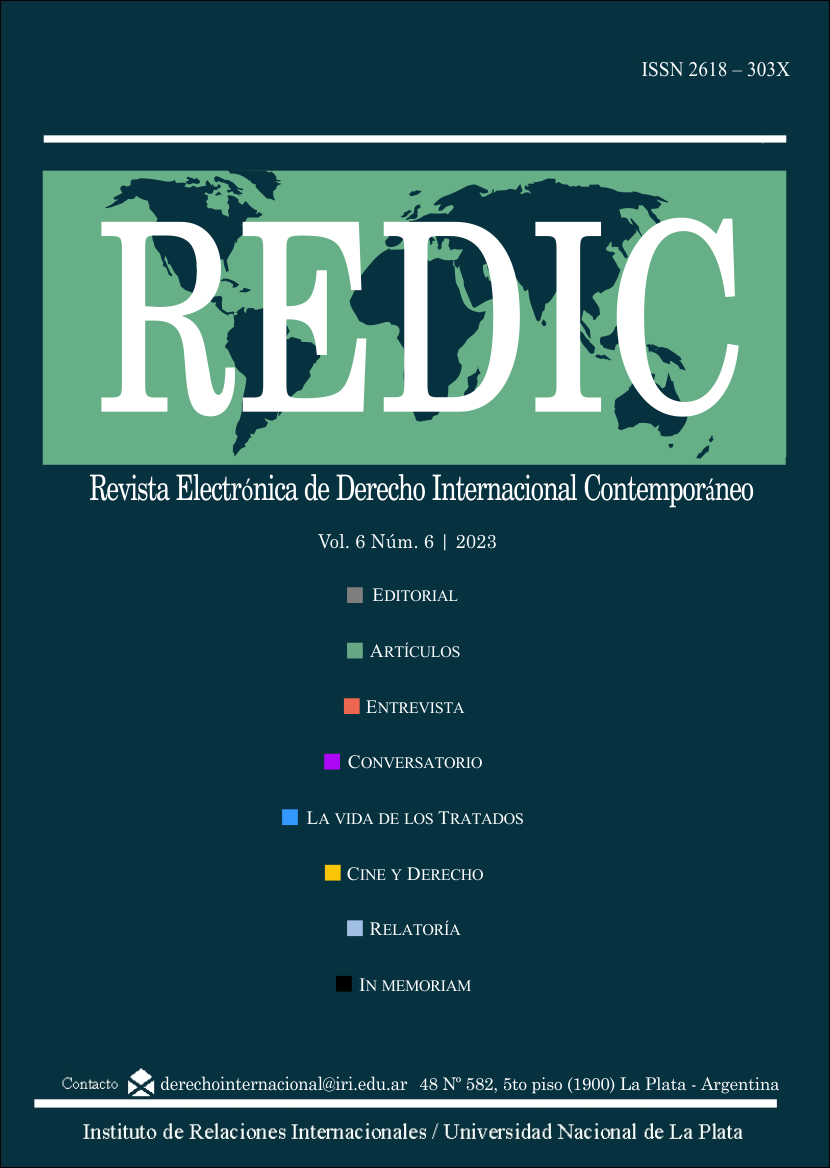The universalization of human rights under review: 70 years after the Convention on the political rights of women
DOI:
https://doi.org/10.24215/2618303Xe053Keywords:
women's rights, international women's movement, human rights, women's political rights, universalizationAbstract
The year 2023 marks the 70th anniversary of the opening for signature of the Convention on the Political Rights of Women. This multilateral treaty was adopted in a historic era for the internationalization of human rights which, seventy years later, requires examination. Our analysis stems from the work carried out by the international women's movement, working alongside international institutions to achieve equality in the regulation of universal rights. This research follows a detailed classification of the international legal context, in neutral terms and from a specific perspective, allowing for two comparative blocks of analysis, so as to show that it is possible for the norm to be neutrally valid when it remains on the surface and stays away from controversy and opposition, while regulating people's international rights. However, such neutral validity of the norm fails when regulating the universal system of human rights if a person's specific characteristics and various features are beyond its scope. The chosen sociological phenomenon is tackled using the works of scholars from various social sciences who have researched the topic in depth and placing it at its historical time, within its legal framework and in its axiological context.
Downloads
References
Barbé Izuel, E. (2010). Multilateralismo: adaptación a un mundo con potencias emergentes. Revista Española de Derecho Internacional, 62(2), 21-50.
Barbé Izuel, E. (2021). El sistema internacional: Imagen y análisis de las relaciones internacionales. En J. Beneyto y C. Jiménez Piernas (Dirs.), Concepto y Fuentes del Derecho Internacional (pp. 105-158). Tirant Lo Blanch.
Beneyto, J. M. (2021). Aproximación a la historia del Derecho Internacional. En J. Beneyto y C. Jiménez Piernas (Dirs.), Concepto y Fuentes del Derecho Internacional (pp. 18-101). Tirant Lo Blanch.
Benhabib, S. (2006). El ser y el otro en la ética contemporánea. Feminismo, comunitarismo y posmodernismo. Gedisa.
Carrillo Salcedo, J. A. (1999). Dignidad frente a barbarie. La Declaración Universal de los Derechos Humanos, cincuenta años después. Trotta.
Casado Raigón, R. (2021). Derecho dispositivo y Derecho imperativo. En J. Beneyto y C. Jiménez Piernas (Dirs.), Concepto y Fuentes del Derecho Internacional (pp. 274-337). Tirant Lo Blanch.
Gómez Isa, F. y Pureza, J. M. (2004). La protección internacional de los derechos humanos en los albores del siglo XXI. Universidad de Deusto.
Jiménez Piernas, C. (2021). Fundamento y concepto del Derecho Internacional Público. En J. Beneyto y C. Jiménez Piernas (Dirs.), Concepto y Fuentes del Derecho Internacional (pp. 217-267). Tirant Lo Blanch.
Mangas Martín, A. (2015). Democracia y Estado de Derecho: respuestas legales desde las Naciones Unidas. Revista Catalana de Dret Públic, 50, 1-18. http://dx.doi.org/10.2436/20.8030.01.40
Maquieira D´Angelo, V. (2010). Introducción. Mujeres, globalización y derechos humanos. La globalización y sus paradojas. En V. Maquieira D´Angelo (Ed.), Mujeres, globalización y derechos Humanos (pp. 1-96). Cátedra, Universidad de Valencia.
Mariño Menéndez, F. (2005). Los límites de la noción formal del orden público internacional. En A. Salinas de Frías y M. Vargas Gómez-Urrutia (Coords.), Soberanía del Estado y derecho internacional: homenaje al profesor Juan Antonio Carrillo Salcedo. Tomo II. Universidad de Córdoba. Universidad de Sevilla. Universidad de Málaga.
Pastor Ridruejo, J. A. (2015). Curso de Derecho Internacional Público y Organizaciones Internacionales. Técnos.
Pietilä, H. (2007). The unfinished story of women and the United Nations. NGLS development dossiers. https://digitallibrary.un.org/record/592517
Pinto, M. (2012). El ius cogens en la jurisprudencia internacional. Revista Jurídica de Buenos Aires, 37(86), 3-21.
Pureza, J. M. (2005). Encrucijadas teorías del Derecho Internacional en la transición paradigmática. En A. Salinas de Frías y M. Vargas Gómez-Urrutia (Coords.), Soberanía del Estado y derecho internacional: homenaje al profesor Juan Antonio Carrillo Salcedo. Tomo II. Universidad de Córdoba. Universidad de Sevilla. Universidad de Málaga.
Ruiz-Giménez Arrieta, I. (2020). Algunas reflexiones teóricas sobre la relevancia actual de Naciones Unidas. Revista Española de Derecho Internacional, 72(2), 331-339. https://www.revista-redi.es/redi/article/view/485
Additional Files
Published
How to Cite
Issue
Section
License
Copyright (c) 2023 Ana Isabel Carreras Presencio

This work is licensed under a Creative Commons Attribution-NonCommercial-ShareAlike 4.0 International License.
Aquellos autores/as que tengan publicaciones con esta revista, aceptan los términos siguientes:
- Los autores/as conservarán sus derechos de autor y garantizarán a la revista el derecho de primera publicación de su obra, el cuál estará simultáneamente sujeto a la Licencia de reconocimiento de Creative Commons (BY-NC-SA) 4.0 que permite a terceros compartir la obra siempre que se indique su autor y su primera publicación esta revista, no se haga uso comercial, y si se remezcla, se transforma o se crea a partir del material, se debe distribuir bajo la misma licencia del original.
- Los autores/as podrán adoptar otros acuerdos de licencia no exclusiva de distribución de la versión de la obra publicada (p. ej.: depositarla en un archivo telemático institucional o publicarla en un volumen monográfico) siempre que se indique la publicación inicial en esta revista.
- Se permite y recomienda a los autores/as difundir su obra a través de Internet (p. ej.: en archivos telemáticos institucionales o en su página web) antes y durante el proceso de envío, lo cual puede producir intercambios interesantes y aumentar las citas de la obra publicada. (Véase El efecto del acceso abierto).





















